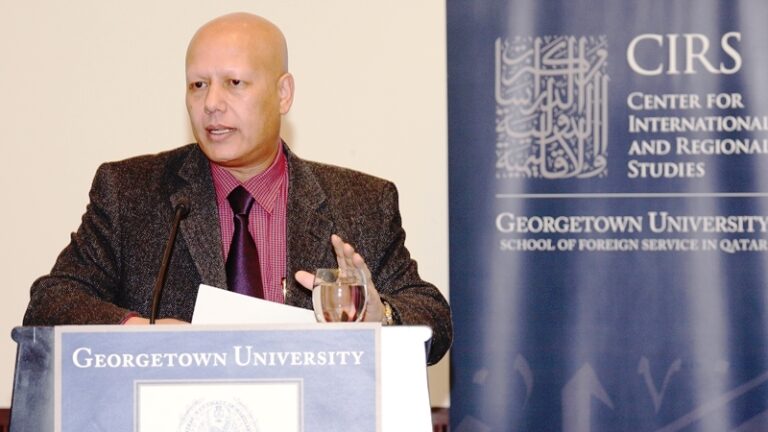Dialogue Series, Race & Society, Regional Studies
Ahmad Sa'di on Population Management and Political Control

On February 21, 2012, Ahmad H. Sa’di, Professor in the Department of Politics and Government at Ben-Gurion University of Negev, delivered a CIRS Monthly Dialogue on the topic “Population Management and Political Control: Israel’s Policies towards the Palestinians in the First Two Decades, 1948-1968.” Sa’di based his lecture on the results of investigations into historical and archival Israeli documents regarding the management of the Palestinian population.
Israeli authorities and academics claim that Israel never conducted any form of systematic control of Palestinian populations. Yet, the documents that Sa’di analyzed rebuke this claim and list detailed descriptions of the extreme measures taken in order for Israeli authorities to control and reduce the size of the Palestinian population during the early years of establishing the Israeli state. These “archival documents could shed light and help clarify premises of policies, world views, dogmas, and what social scientists call discourses,” he said.
Sa’di recounted that Israel was established in 1948 through the occupation of 77.8% of historical Palestine. In November 1948, Israel conducted a census aimed at presenting a legal position to deny Palestinian refugees the right of return at the end of the war. “This census founded the political basis for a hierarchical order of citizenship rights and entitlements. Jewish settlers who arrived before 1948 were placed at the top, while Palestinian ‘present absentees’ were relegated to the bottom,” he explained.
Sa’di argued that Israeli state policies focused on three issues that would comprise the basis of the state’s future strategy regarding population surveillance and control and involved strategies toward decreasing the size of the Palestinian population; rearranging its spatial distribution; and subjecting it to a tight regime of control and surveillance. Beside overt and coercive transfers and ghettoization, other means of control included “insurmountable legal and practical hurdles in order to prevent the establishment of an organized political body to voice the opinions and concerns of the minority,” as well as encouraging Arab students to study abroad and establishing Arabic-language media networks that espoused Israeli ideology.
Further, more nuanced, measures involved the introduction of family planning and the initiation of measures for the liberation of women – particularly the raising of their educational standards. Israeli policymakers reached the conclusion that an increase in a woman’s education causes a decline in her fertility.
Sa’di concluded the lecture by pointing to the necessity of conducting independent archival investigation that questions the dominant discourse relayed by Israel. He argued that not only do these documents show what guided Israeli thinking in the early years of establishing the state, but also the relevance of Israeli regulations to current realities on the ground. “These tactics carry the fingerprints of Israeli diplomacy and aimed to absolve the Israeli State of liability for the actions of its agents,” Sa’di explained. He cautioned that it is always important to point to the discrepancy between representation and reality. This, he said, “should not be overlooked nor underestimated, particularly since Israel has always endeavored to present the image of a democratic, enlightened, and moral state.”
Ahmad Sa’di received a Ph.D. degree in sociology from the University of Manchester in 1991, followed by two years of service for a Palestinian NGO. Sa’di has published over 38 articles, in English, Arabic, Hebrew, German and Japanese, and most recently co-edited a book of Palestinian memoirs entitled Nakba: Palestine, 1948 and the Claims of Memory. His areas of interest include political sociology, the sociology of developing nations, social movements and political mobilization, and the discourse and methods of political control and surveillance used by Israel to control Palestinian citizens.
Article by Suzi Mirgani, Manager and Editor of CIRS Publications